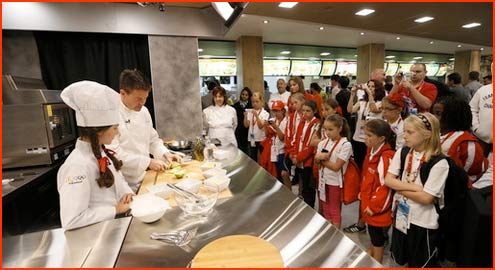
A week before the 2012 Olympic Games began, the esteemed British publication The Lancet published an editorial regretting the ubiquitous presence of fast food corporations. Apparently, Coca-Cola now owns the ancient and venerated custom of the torch relay. (And people complained a Hells Angel carried the torch!) Imagine, the world’s biggest McDonald’s outlet, right there in London!
The photo on this page comes from McDonald’s, and depicts a demo led by the company’s executive chef and one of the Happy Meal Chef winners, as the other winner and several finalists look on. This event was an aspect of an Olympic-related event called the Global Champions of Play program.
In the light of the childhood obesity epidemic, the Academy of Medical Royal Colleges does not like the message sent to children by all this glorification of fast food. And guess what — some of the mega-corporations have already signed contracts to continue Olympic sponsorship until the year 2020. The Lancet says:
The Games should encourage physical activity, promote healthy living, and inspire the next generation to exercise. However, marring this healthy vision has been the choice of junk food and drink giants — McDonald’s, Coca-Cola, and Cadbury’s — as major sponsors of the event. Health campaigners have rightly been dismayed… But the news is not all bad: after the closing ceremony of the Paralympics, the McDonald’s mega-restaurant will be bulldozed. Harder to erase will be the long-term effect of Games-associated junk food advertising on people’s hearts and waistlines — definitely one Olympic legacy the world can do without.
Rose Prince interviewed some of this year’s Olympic athletes about their eating habits, and came up with chocolate chip pancakes, chicken nuggets, French toast, pizza, and so on. A male swimmer might require 12,000 calories a day, unlike the average man whose need is more like 2,500 calories. Athletes and coaches agree that it’s really difficult to take in that much fuel without resorting to massive amounts of carbohydrates and generous helpings of sugar. But Prince also describes the opposing trend toward unprocessed food, and gives many examples, such as:
Team GB’s cycling silver medal-winning Lizzie Armitstead has been a vegetarian since the age of 10. She powered her medal win on Sunday by going to work on an egg. For a week before, she ate omelettes for lunch and dinner. Dairy foods and eggs provide a lot of the amino acids and iron normally taken in by meat eaters.
Prince describes U.S. swimmer Ryan Lochte as a “former junk food addict” who, perhaps as an experiment, cleaned up his diet to prepare for the 2012 games:
He credits his new super-charged swims to an improved diet. The eight-time Olympic medal winner says he has under-performed so far in his career because of his bad diet.
This year, Lochte won a gold medal in the 400-meter individual relay. But reportedly, he still eats a brand of candy that was a childhood favorite. Rachel Bachman also cites Lochte’s career, noting that he has won four medals at the 2008 Olympics on an almost exclusively fast-food diet, and adding:
Among the oddities that distinguish Olympic athletes is their ability to massively consume the very foods everyone else is nagged to avoid. The Olympic workouts of elite swimmers burn up thousands of calories and trigger training table menus that sound like the wish list for a kid’s birthday party: Big Macs, Mountain Dew, Skittles, chocolate milk.
Bachman goes on to say that swimmer Nathan Adrian is also partial to a particular kind of junk food. He told the reporter that because of his roommates, a certain processed hyperpalatable dessert item kept showing up in the kitchen, and eventually wore down his resistance. One swimmer loves chocolate of all kinds, and another admits to a fondness for brownie sundaes, while another self-identifies as a “greasy cheeseburger kind of guy.” The journalist finishes up with a sad story:
Garrett Weber-Gale, who won two golds during swim relays in Beijing, has since apprenticed at restaurants in Italy and New York and started AthleticFoodie.com. He has railed against refined sugars and connected his Olympic prowess at the last Games to his hand-prepared meals. He won’t get another chance in London. At the trials last month, he finished eighth in 100-meter freestyle.
Any misconception lies in getting the cause-and-effect relationship backward. Eating junk food certainly did not turn these people into medal-winning athletes. Perhaps the extreme daily workouts allow these athletes to, apparently and seemingly, “get away with” eating junk food, at least for the present. So maybe there’s an answer for parents to give their importuning kids: “Fine, after you train five hours a day for a year, we’ll add junk food to your diet.”
Your responses and feedback are welcome!
Source: “The Difficult Investigation,” The Aging Rebel, 05/03/12
Source: “Chariots of fries,” The Lancet, 07/21/12
Source: “Can fast food really be the breakfast of Olympic champions?,” The Telegraph via CalgaryHerald.com, 07/31/12
Source: “Olympic Alchemy: Turning Junk Food Into Gold,” The Wall Street Journal, 07/31/12

 FAQs and Media Requests:
FAQs and Media Requests: 












3 Responses
The Childhood obesity is really a curse for them. They could miss out the most special time of their life by being overweight. Many enjoyments of their life can be missed out because of this very reason. This very physical activities among children can be helpful in loosing their weight and they can stay healthy by being physically fit and strong.
Yes that is sad, years that can never be gotten back.
Thanks for writing in.
It’s my pleasure Pat………..This is really very serious thing, so I felt to keep my views on this.